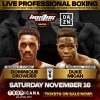Jack Dempsey never officially fought in Atlantic City. But that doesn’t mean he didn’t prepare for any of his big battles there.
The fact is, he really liked the place.
In 1921, the boxing world was anxiously awaiting what was expected to be the most lucrative fight in the sport’s history to date. This was the heavyweight championship fight between champion Dempsey and challenger Georges Carpentier, a Frenchman who, at that time, was recognized by the NYSAC (the all-powerful New York commission) as world light heavyweight titleholder.
The fight had at one point been considered a possibility for Atlantic City; in fact, mayor Edward Bader had proposed building a stadium to host it, out by the new airport.
Promoter Tex Rickard had other ideas. He had received word from the governor of New York – who was generally opposed to prizefights – that the bout would not be welcome in the Empire State. But Rickard wanted for the venue to be as close to New York City as possible.
He also needed a stadium that was as big or bigger than anything available at the time. There was more pre-fight interest than even Rickard had anticipated, and he felt that a building that could accommodate between 80,000 and 90,000 fans might be necessary.
That led him to Jersey City and a patch of land owned by one John F. Boyle. The structure was built upon what henceforth became known as “Boyle’s Thirty Acres.”
So Dempsey was not going to engage in the “Battle of the Century” in Atlantic City. But it wasn’t much of a problem convincing him to train there.
He set up camp on the site of the airport. In those days, it was not all that unusual for a fighter to invite the public to watch training sessions. And in the case of Dempsey, his manager, Jack Kearns, charged a dollar to fans who wanted to see the action. Dempsey, one of the most popular athletes in the United States, drew great crowds, and this was depicted to an extent in the HBO series “Boardwalk Empire.”
Dempsey spent two months training in A.C., staying at the stately Hotel Alamac while he was there. It should be to no one’s surprise that the town rolled out the red carpet for the heavyweight champ. Mayor Bader saw to it that whatever he needed, he had, and he became very friendly with Dempsey.
The Manassa Mauler liked the area so much that after he took care of business, knocking out Carpentier in four rounds, he went back to A.C. to get some rest and relaxation.
In 1926, he returned to Atlantic City with the purpose of preparing for his fight with Gene Tunney. This time, however, there was not as much pomp and circumstance. Training sessions were decidedly low-key, and the public was not invited. They were held at the Greyhound Park, a dog track. Dempsey and his wife stayed at the Ambassador Hotel, which was relatively new at the time and which, by the way, is the site where the Tropicana Atlantic City Hotel and Casino (where Boxing Insider Promotions conducts its shows) currently stands.
The mood was more serious; Dempsey had been out of the ring for three years, since knocking out Luis Angel Firpo at the Polo Grounds. And this opponent was more formidable than Firpo, and certainly Carpentier. Tunney, a slick boxer, had lost only once in his career – to the all-time great Harry Greb.
The bout was held at Sesquicentennial Stadium in Philadelphia, and was scheduled for only ten rounds. The inactivity obviously had its effect on Dempsey, as he was outboxed by Tunney over the ten-round distance.
One year later, after he knocked out Jack Sharkey in an eliminator, Dempsey fought the rematch against Tunney in what became known as the “Long Count Fight,” which still evokes arguments to this day. Dempsey suffered another ten-round decision loss, and then officially retired from the ring.



